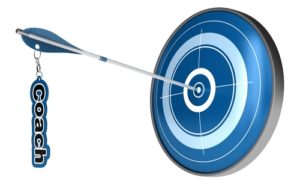 Let’s face it; there’s nothing like receiving some acknowledgement to make you feel good! As coaches and mentors, listening for what we can genuinely acknowledge in our client is an essential skill, one that builds trust and supports the client to gain confidence.
Let’s face it; there’s nothing like receiving some acknowledgement to make you feel good! As coaches and mentors, listening for what we can genuinely acknowledge in our client is an essential skill, one that builds trust and supports the client to gain confidence.
Well that acknowledgement goes both ways! Recently I received an email of gratitude from someone who had purchased my audio/visual product, The Target Approach; Demystifying the ICF Core Competencies
Here is what the person wrote, “Grateful. I feel like I’ve won the lottery! I purchased your Target Approach video and it is the evolutionary missing link! The single most helpful thing I’ve done to understand the nuances of the competencies. Brilliant! And such value. I’m not kidding when I say that I’m a far superior coach to who I was even a week ago. Thank you so much. You’re a wonderful educator.”
This is a good example of “Direct Communication.” And yes, I did feel good receiving that, not just reading the words, but fully receiving the intent to acknowledge me. And that’s something I’ve worked on over the years; to actually ‘receive’ the acknowledgement, not just read the words.
Target Competencies
In receiving this acknowledgement, it made me aware of how grateful I am for the opportunities I have to work with so many wonderful coaches who are committed to being the best coach they can be for their clients.
So it’s out of that gratitude that I want to share with you the “Target Competencies” in The Target Approach that were part of what this person feels made her a “far superior coach to who I was even a week ago.”
For more background, you can read about The Target Approach here
In my model, I break the 11 ICF Core Competencies into three categories:
- Target Competencies
- Application Competencies
- Output Competencies
The Target Competencies are the key to any successful coaching session, plus one from the “Application Competencies” (more on that later). In this article, I’m going to give you the competencies to “target” for coaching success.
Coaching Presence
My experience over 16 years as a coach, trainer and mentor has shown me that the critical competency that affects every other competency is “Coaching Presence” (the 4th ICF competency). The ICF definition of this competency is, “Ability to be fully conscious and create spontaneous relationship with the client, employing a style that is open, flexible and confident.”
Diving a bit deeper into this definition, I invite you to consider:
- What does it mean to you to be present?
- What are you mostly present to?
- How do you stay present and in the moment with your client?
- What does it mean to be fully conscious? Create spontaneous relationship?
- How flexible and open are you? What evidences flexible and openness?
- How confident are you and trusting of your coaching skills?
- How confident are you in your ability to be present to the full human being of your client?
As you might gather from my questions, Coaching Presence encompasses your beliefs about what you think you need to do in order to be a successful coach. Some of those beliefs are likely to be supportive of partnering with your client, and of drawing out self-knowledge in the client, while some of those beliefs may be counterproductive. For example, if you believe you need to make sure the client gets value from the session, you are likely bringing your agenda, instead of skillfully working with the client so they get what they need from the session (not what you think they need to get).
Ethics
Another competency in the “Target Competencies” is Ethics, because you need to know what a coaching process is, and how to stay within the bounds of a coaching process. Ethics is ICF competency #1).
The simplest coaching process is this;
- Where is the client now?
- Where do they want to be?
- How are they going to close the gap from where they are now to where they want to be?
So if you know what a coaching process is and stay within those bounds, you are engaging your Coaching Presence, not some other type of presence. If you shift into counseling, teaching, training, mentoring, parenting or consulting, you are no longer coaching. That is why ethics is a Target Competency in my model.
Active Listening
So if you know what a coaching process is, and you are present with and to your client, the competency you’re already engaging is your Listening, which is another competency in my Target Competencies (Active Listening is ICF competency #5).
What you feel is important to listen for, what you don’t feel is important, and what you determine to inquire into, are based on your version of listening. So we coaches have to be aware of how our listening is filtered through our beliefs and biases.
How do we listen for the deepest, human part of the client? Many coaches feel comfortable listening for the “What” or situation, but feel less comfortable listening and inquiring about the “Who” of the client which includes their beliefs, values, emotions and assumptions.
Powerful Questioning
Your listening is informed by your Coaching Presence, which includes your beliefs and biases, which in turn determine what type of question you ask (Powerful Questioning is ICF competency #6). The ICF definition of this competency is, “Ability to ask questions that reveal the information needed for maximum benefit to the coaching relationship and the client.”
To me, this definition is in reverse, where the coach is responsible for asking questions for maximum benefit to the client. To be honest, I’m not sure what “maximum benefit to the coaching relationship” means.
The most effective questions are those that support the client to discover more about themselves, their thinking, their beliefs, their fears, their strengths, their success strategies, how their emotions influence their behavior, their desires, their values, their vision….and so on. A question that reveals to the client the information they need, will support them to gain the awareness of what to do next. And that information may reveal more about Who they are so they can then determine What to do in alignment with Who they are.
Direct Communication
The last competency in the Target Competencies is Direct Communication (ICF competency #7). This competency includes how clearly and succinctly you speak, and how cleanly you craft your questions, observations, reflections and intuitions. The coach who sent me her acknowledgement was a good example of being direct and succinct, and also communicating directly to me the value she received. These are good examples of direct communication.
This competency of Direct Communication also encompasses how effectively you incorporate the client’s specific use of language, including engaging in the client’s visual language as metaphor or analogy.
So there you have it. The ICF Core Competencies in the Target Competencies in my model are:
- Coaching Presence
- Ethics
- Active Listening
- Powerful Questioning
- Direct Communication
There’s one other competency you need to really know well for coaching success and that is Establishing the Coaching Agreement for each coaching session. I’ve created a product bundle just on this competency because it’s a vital “Application Competency” in my Target Approach model.
I wish for you to be confident in your coaching skills, and become a far superior coach than you are now, in service of your coaching clients.
Our last Mentor Coaching Program for 2015 is sold out!
We’ll be announcing 2016 mentoring programs via our monthly Coaching Brief newsletter in October
Carly Anderson and Karen Boskemper offer an awesome mentor coaching group and individual program that has many exclusive offerings for our participants. Both have been trained by the ICF to assess using the new PCC Markers.
One of those offerings is an extensive library of MCC, PCC and ACC coaching sessions for our participants to listen to, evaluate, debrief, and learn from, along with The Target Approach to demystifying the ICF core competencies. These are incredibly valuable learning tools, and will accelerate your understanding of competency distinctions.
Here’s where you’ll find more about The Mentor Coaching Group
Carly and Karen also offer other mentoring options which you can find in the Store

